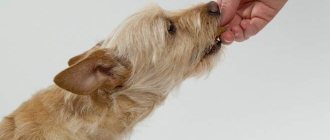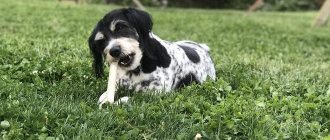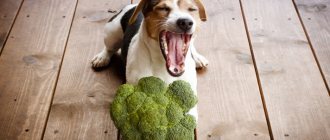Every owner wants to see their pet cheerful and active, with a strong immune system and a good appetite. Everyone knows that in addition to the main food, meat, dogs also need vitamins. The only question is whether to buy her synthetic vitamin supplements or give her natural ones along with plant foods.
Of course, it will be better for the pet if plant foods are included in its diet, since it contains many microelements and vitamins necessary for the dog’s full development. Not all vegetables are equally beneficial for an animal; some of them can cause bloating and indigestion. Can a dog eat bell pepper, what are its beneficial properties and can it cause harm?
Benefit
This product is very useful. The beneficial effect is manifested as follows:
- the immune system is strengthened due to the content of ascorbic acid in pepper;
- blood circulation improves;
- the coat becomes thicker and hair loss is prevented;
- the correct formation of the skeletal system occurs;
- the reproductive system functions correctly, its diseases are prevented;
- The dog becomes calmer, aggression disappears due to improved functioning of the nervous system and the intake of vitamin B into its body.
Bell peppers contain potassium and sodium, which improve the general condition of the dog, prevent anemia and the formation of blood clots. This product is especially recommended for stomach upsets. It contains the alkaloid capsaicin, which normalizes digestive processes and takes care of the health of the pancreas.
Healthy vegetables
Among the abundance of vegetable crops, there are very few that will have a beneficial effect on the animal’s body. They can be given to dogs without fear that the pet will get sick. Let's figure out which vegetables are best to treat shaggy pets.
Cabbage
Many dogs enjoy eating cabbage leaves. Fresh and crunchy, they are full of antioxidants that improve the functioning of the animal's gastrointestinal tract and make its coat soft and silky. However, it is better not to give this vegetable to dogs in excess; it has a carminative effect. It is preferable to give it boiled.
Carrot
The beneficial properties of carrots are well known. It contains a lot of carotene, which improves the production of vitamin A in the body. In addition, the root vegetable contains potassium, which has a beneficial effect on the heart muscle, as well as fiber. It can often be found in low-calorie, restorative diets for pets.
Another indisputable advantage of carrots is its crunchy properties. With the help of this vegetable you can carry out mild dental prevention. Experienced experts recommend that dog breeders introduce the root vegetable into the puppy’s diet from childhood, as it reduces the itching that occurs during teething.
Carrots can be served either raw or boiled. For variety, the owner can cut it into different geometric shapes: circles, cubes, diamonds. Some dog trainers even use pieces of carrots to reinforce the dog's correct behavior.
Celery
Vegetables for dogs are a storehouse of nutrients. In this regard, celery occupies a special place, containing such an amount of vitamins, phosphorus, calcium and potassium that any other vegetable pales next to it. Regular use of it halves the risk of an animal developing cancer and any heart disease.
The astringents in celery can freshen your dog's breath, and its anti-inflammatory properties make the vegetable an excellent remedy for arthritis. Owners need to feed their pet only the stem of this plant. However, keep in mind that the consistency of celery is extremely hard, so your dog may not chew it very thoroughly, which will reduce the positive effect. You can eliminate this problem by simply chopping the stem in a blender, or cutting it into small pieces.
cucumbers
An ideal vegetable for dogs that are overweight. It does not contain a large amount of complex carbohydrates or fats, but it is full of magnesium and potassium, those microelements that have a positive effect on the nervous system and make blood vessels elastic.
Turnip
This root vegetable contains a huge amount of calcium, which is beneficial for bones. In addition, turnip has pronounced antiseptic and diuretic properties and promotes intestinal function. It can be served both raw and baked.
Giving turnips to dogs that suffer from kidney failure and liver problems is contraindicated. It acts as a strong laxative on some pets. Therefore, before giving your furry friend a full portion, test his tolerance with a small piece.
bell pepper
This beautiful, aromatic vegetable contains an abundance of B vitamins, as well as iodine, magnesium, phosphorus and zinc. In terms of usefulness, bell pepper is in second place after celery. When choosing a vegetable for your pet, try to choose red pepper, as it contains significantly more nutrients.
Harm
Despite the benefits and beneficial effects of pepper on the body, this product can harm it. This happens if the pet has eaten too much pepper or has contraindications to its use.
If your pet has a stomach ulcer or colitis , then this vegetable is strictly prohibited. It can provoke a deterioration in well-being and an exacerbation of the disease. Flatulence may occur, and in severe cases, bowel dysfunction.
Increased stomach acidity, liver and kidney pathologies lead to refusal of this product. It can provoke the development of existing diseases.
In rare cases, an allergy to this product occurs. It manifests itself in the form of a deterioration in the pet’s condition. Vomiting, fever and bowel dysfunction are possible. The dog becomes lethargic, refuses to play, lies around a lot and refuses to eat. In this case, she is shown to the veterinarian.
No. 7. Alcohol
Standard rubbing alcohol has an unpleasant odor to dogs. You can spray alcohol onto cotton balls and place them on the area where your dog is acting up.
The effectiveness of alcohol will depend entirely on its concentration. The higher the alcohol percentage, the stronger the smell.
As with any chemical, it is important to keep your dog safe. Never spray it on your dog. Many veterinarians do not even recommend rubbing alcohol on a dog's skin after an injury, so it is important to avoid any contact with the dog.
In addition, alcohol is highly flammable. Keep this in mind when placing alcohol-soaked cotton balls around your home.
Beaphar Stop it Dog spray for repelling dogs
How to give sweets?
It is recommended to give bell pepper to your pet 1-2 times a week. This is enough for his body to be filled with useful substances and there is no harm from consuming such a product.
You can feed your dog pepper in different forms: raw, stewed, baked. If she does not want to eat this vegetable separately, you can add it to the food.
You cannot add salt, sugar or spices to pepper. They have a negative impact on health and can, in combination with this product, lead to disruption of digestive processes. Canned peppers are prohibited: they contain a lot of spices, salt and vinegar, and this irritates the gastric mucosa.
Before use, remove the seeds from the pepper, since your pet may be allergic to them. The red vegetable is considered the most useful: it contains more vitamins and minerals.
A large amount of pepper is considered dangerous; for this reason, a pet is given no more than one piece. At first, you should limit the serving to only half the pepper so that the dog’s body gets used to it.
No. 3. Citrus
Citrus scents can be found in a wide variety of household products. It is used in cleaning products, room deodorizers, candles and more.
This scent is pleasant to us, but dogs absolutely despise it.
The problem with citrus fruits is that the oils in the skin can irritate your pup's respiratory tract.
Citrus oils are commonly used in products designed to prevent dogs from urinating in certain areas.
Instead of shelling out a lot of money, you can easily make the product yourself.
All it requires is the peel of oranges, lemons, limes or grapefruits. Simply place the skins on the ground and your dog will avoid the area.
You can also use fruit juice to create a spray.
If you want something more powerful, citrus essential oils are also available. They are very concentrated, so you can dilute the oils with a little water before spraying them around your home or yard.
Beaphar Stop it Dog spray for repelling dogs
Got sick
If there is harm from eating pepper, the dog’s condition will almost immediately worsen. She will become lethargic, drowsy, and refuse to go for a walk or play. Some dogs become more aggressive and growl. Veterinarians note other manifestations:
- bowel dysfunction;
- flatulence;
- vomit;
- insomnia;
- refusal of food;
- increased body temperature;
- stomach ache.
The dog growls or whines, lies motionless and does not respond to the owner’s words. A pet in this condition needs help. If the dog is feeling unwell and the dog is practically motionless and completely weakened, they urgently call a veterinarian to the house, who will prescribe medications.
Before the doctor arrives, it is recommended to provide the animal with plenty of fluids. Water will help relieve your dog's condition. You can give activated carbon to cleanse the body and remove harmful substances. The dosage of coal is calculated by the formula: 1 g of coal / 1 kg of weight. Before the doctor arrives, the pet is provided with rest and its condition is monitored.
No. 4. Fresh herbs
Many dogs don't like fresh herbs like mint or rosemary. They have a very pungent aroma that dogs don't like. You can use this fact to your advantage and plan for fresh herbs in your garden.
You can also create a simple spray solution by soaking the grass in water to extract the oils.
Although most dogs cannot tolerate the smell of grass, some will have no problem with mint.
In fact, there are many mint-flavored treats that can help combat bad breath. Before you start purchasing mint products, see how your dog reacts to the smell and taste.
Eats from the garden
Dogs eat peppers from the garden and approach them because of the smell. It attracts animals and has special substances that make them consume pepper again and again. To wean her off this, it is recommended to resort to some tricks.
Baking soda is an excellent repellent . Experts advise sprinkling this product in small quantities on the beds, or diluting a weak soda solution and irrigating the beds and plant leaves with it. They will not be harmed by the soda, and the animal will stop eating from the garden.
Alcohol will also work . Napkins and or cotton wool are impregnated with it and placed next to the beds. The smell of alcohol is strong and can be felt by the dog several meters away, so it will not approach the beds or the pepper itself.
Vegetables that are not recommended for dogs
Broccoli is a source of fiber and will not harm your pet in moderation, but due to the isothiocyanate contained in broccoli, you should avoid this vegetable because isothiocyanate in large quantities is toxic to dogs. The amount of broccoli depends on the size of the pet and should not account for more than 5% of the diet. There is no point in feeding your dog broccoli in large quantities, which can lead to the death of the animal; this vegetable can easily be replaced with another, safer one.
Corn is an allergen and not all dogs can eat it. But if your dog doesn't have allergies, he can be given a few grains as a treat without oil or other additives. A lot of corn is harmful to digestion, and there is not much benefit from it, considering that it passes “through and through,” i.e., is not digested. You should not give corn cobs to chew, as they are not digestible and can cause intestinal obstruction, leading to the death of the animal.
Tomatoes can be included in an animal’s diet, but only as a treat. With frequent feeding in large quantities, stomach upset occurs, tremors, rapid heartbeat may occur, and some dogs experience allergies. Fresh ripe tomatoes are the safest, but green tomatoes and various tomato sauces should not be given.
Eggplants can be fed in small quantities, checking the body's reaction. Eggplant can cause an allergic reaction in some dogs. Contraindicated in dogs with kidney problems. The vegetable can be given occasionally, boiled or baked.
Potatoes are not recommended for dogs because they are not digestible and in large quantities clog the intestines. Raw potatoes are toxic, and if boiled potatoes are fed frequently, due to the high potassium content, they can lead to arthritis.
Garlic , however, like onions (including green onions, shallots), should not be given to dogs in any form. Of course, in very small quantities, garlic and onions will not harm health, but in large quantities, and the dog can eat them accidentally, for example, by stealing food containing these products from the table, they are toxic, leading at best to diarrhea and vomiting, and in the worst case to anemia, severe poisoning and death. Poisoning does not occur immediately, but several days after the dog has eaten garlic or onions.
Cabbage can be given in small quantities, raw, but it is better boiled, as it is better digested. In its raw form it causes gas formation (the dog farts often and unpleasantly), pain in the intestines, and bloating. Therefore, it is better to refrain from including cabbage in your dog’s diet. Of course, cabbage contains vitamins A and C, beta-carotene, but its benefits are not so great as to condemn the animal to intestinal discomfort. As for cauliflower and Brussels sprouts, these vegetables should also be given boiled, little by little (Brussels sprouts - 0.5-2 heads, depending on the size of the animal).
A boiled artichoke in small quantities is not dangerous, but the artichoke is poorly digested and often causes digestive upset, in particular diarrhea and vomiting.
to feed rutabaga ; in large quantities it can cause allergies and provoke hypothyroidism - a dysfunction of the thyroid gland.
legumes to a dog, because beans, peas, beans, and soy are not digested and often cause flatulence. It is acceptable to occasionally give fresh young peas, beans, green beans, boiled green soybeans, but there is no benefit from these products.
There is no need to feed your dog olives , especially olives and canned olives. There is no benefit from them, but indigestion can easily be caused. Olives can cause diarrhea or constipation and vomiting.
Pregnant and lactating
Bell peppers are not given to pregnant or lactating dogs. Because of this, the dog’s milk production process may be disrupted and its taste may deteriorate.
During pregnancy, the dog's body becomes more sensitive and weakens. This increases the risk of poisoning and allergies. In order not to risk the health of the animal, this product is abandoned.
No. 2. Ground spices
Your dog's reaction to ground spices is very similar to how your dog reacts to hot peppers.
Ground chili powder, cayenne pepper, ground mustard and more are great for keeping your dog away from areas you want to keep away from canine mischief.
Many ground pepper spices are used in commercial dog repellents due to their effectiveness. If you want to try the spices, you can simply sprinkle them on part of your yard.
Again, never blow it in your dog's face. Fine particles can easily get into your dog's nose and cause burning and irritation.
What else should I feed?
Instead of bell pepper, it is allowed to give vegetables such as:
- carrot;
- pumpkin;
- zucchini;
- cucumber.
These vegetables are safe for dogs and rich in vitamins. They are included in the menu regardless of the breed and age of the animal. It is better to give these foods raw or boiled, since fried vegetables are less digestible.
No. 8. Household cleaning products
Has your dog ever left the room when you started cleaning your kitchen countertops or floors? It's not because they are so polite and appreciate your cleaning work.
This is because they absolutely hate the ingredients in regular household cleaning products.
Many products use chlorine or ammonia. Additionally, some have added citrus scents, making the smell worse for your pup.
Never use cleaning products as a direct repellent on your dog, especially if they contain strong chemicals such as ammonia.
Inhaling ammonia can cause burns and irritation to your dog's throat.
It is always recommended to keep your dog outside when you are cleaning an area they frequent. While it would be dangerous to use household cleaners to repel your puppy, you can simply keep the room clean.
For example, many owners don't want their dog to come into their bathroom. So they just clean it regularly. Once the strong fumes have subsided, your dog will not be in danger.
However, this small amount of odor will be enough to make them reluctant to enter the room.
Can dogs have pepper?
Hot peppers contain capsaicin, which has an irritating effect on the mucous membranes of mammals of all shapes and sizes. In dogs, pepper can cause irritation of the skin and eyes, irritation of the walls of the stomach, intestines, deterioration of the liver and gall bladder, and organs of the urinary system, with constant exposure provoking the development of gastritis, ulcers, and cancer. This spice does not have any positive effect on the health of the pet.
In addition, after eating spicy food, the animal drinks a lot of water. The stomach expands greatly, which can cause gastric volvulus.
It is known that hot pepper in food can affect an animal's sense of smell. Smell is very important for animals, especially for working and hunting breeds.
Paprika should also be avoided, as this seasoning is as harmful to dogs as hot pepper. Causes irritation of the gastrointestinal tract, indigestion (diarrhea), eye and skin irritation.
Other useful spices are spirulina and kelp
Marine seasonings contain many unique beneficial substances. However, any additives will not bring tangible benefits, since they are allowed in minimal quantities. In order for your pet to receive the daily requirement of substances, he will have to eat too many spices.
Are there any seasonings that are safe for dogs? Yes. Will spices benefit your companion? The issue is controversial, so everyone will have to decide for themselves whether to make the pet’s menu more varied.
PS Share your opinion or experience in the comments.
Conclusion
Dogs are very sensitive creatures and can be affected by smells you can't even smell. Every dog is different, so your puppy's reaction may be different from another's.
Over time, you will learn what your dog likes and doesn't like.
When you discover something that your puppy hates, you can use it to keep him away from a certain place.
You can also use this information to help keep your dog comfortable and safe in your home.
What means do you use to stop your dog from crapping anywhere and chewing on useful objects?
Please write in the comments!
No. 10. Cosmetic products
Nail polish, hairspray, and other cosmetic products contain chemicals. Think about how familiar these foods smell.
Most adults can easily identify these foods without even looking at them, especially if they are familiar with them. If the smell is strong for you, it will be almost unbearable for your puppy.
Never use cosmetics as a deterrent. If you plan to use them on yourself, keep your dog in a well-ventilated area that will not be exposed to the fumes.
Additionally, you can buy natural beauty products or those that do not contain harsh chemicals.
No. 9. Perfume or cologne
Perfume and cologne contain a number of ingredients that dogs will avoid. Puppies often ignore their owner the moment a scent is applied to their skin.
This is because perfume products contain chemical compounds, essential oils and alcohol.
All of these ingredients have a strong odor that dogs hate. Not only that, but the scents mask your body's natural odor.
Dogs primarily identify you by your unique scent. Even if you don't feel like you smell much, you have a scent that identifies you.
This smell calms your dog. When you cover it up with strong perfume, your dog won't like it. Although perfumes and colognes are smells that dogs hate, you should never use them as a repellent, no matter how effective they are.
Beaphar Stop it Dog spray for repelling dogs











